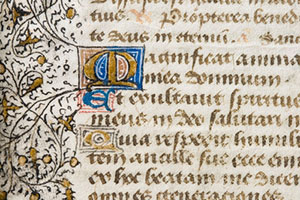 The other day I received a letter from a student. It was short, hand written (in pencil) and informed me how much she liked my book, The Secret School. One question was asked: “Do you like to write?”
The other day I received a letter from a student. It was short, hand written (in pencil) and informed me how much she liked my book, The Secret School. One question was asked: “Do you like to write?”
Attached to the letter was a note from the student’s teacher. “Dear Author. I have asked my students to choose an author whose book they read and write a letter saying why they enjoyed it. We would all appreciate an answer. For my students this is probably the first snail-mail letter they have ever written.”
Two weeks ago, I visited the Morgan Library in NYC. On display were some cuneiform clay tablets from ancient Mesopotamia, the oldest form of human writing. Also on display were Medieval illuminated manuscripts, as well as a Guttenberg Bible (the first printed book with interchangeable type), one of the fifty that exist in the world.
I am old enough to have had penmanship lessons in elementary school. But nowadays, I am so used to writing with a computer; I find it hard to write (by hand) more than a note.
When we think of writing—particularly in a blog such as this—we are expressing ideas about the craft of story creation, not the act of writing. Yet I—and I know other writers who do this too—fuss about the font I use on my computer. I want the font to connect to the story. I take particular pleasure in a font that looks as if I am using my old college portable typewriter. I want my books to look good, and in part, I am thinking about fonts.
Since computer use has become commonplace, long books have become common. When you write by hand, you hold and engage with every word.
Maybe we should pay more attention to how we set down our letters.
3 thoughts on “Handwritten v. computer-written”
I am so thankful for computers. For me it merely allows me to work faster and cleaner. For my dyslexic/dysgraphic child, it is his tool to communicate all the lively thoughts in his mind without huper-human struggle, frustration and embarrasment. I tell him often that writing is an process that happens in your brain, your heart and your soul. Pencils, pens, computers and dictation devices are all merely tools. For him the computer is the tool that has transformed him into a budding writer and a happy, successful student.
As someone who is dysgraphic, the computer has made a big difference in my life, too. For all those who have problems with the act of writing, I say bravo for computers. That said, caligraphy is an art, worth the learning and preserving.
Typography is really big right now and I predict hand-written things will come back in the years forward. BTW–my daughter is dysgraphic too and I didn’t even know about it until I read your autobiography and realized she has the same thing! I told her about you (we have read Doyle together) and she really felt better hearing that there was a real author with her same challenge. That said, I really cherish hand written letters from the past, when I was a girl. Thanks for helping me remember!